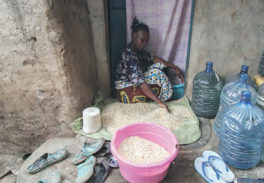
Prices of unga are
going down and have remained below Sh200 per two kg packet.
According to this month’s food and nutrition security report, the average retail price of a two kg packet of unga is currently Sh110 compared to last month’s Sh139.
“The maize meal prices have been reducing and have remained below the 2023 prices,” the report says.
The average price of wholesale and retail prices maize grain in the counties was Sh3,070 and Sh3,500 respectively.
“The highest wholesale price was reported in Nairobi at Sh3,600 while the lowest wholesale price was reported in Bungoma at Sh2,160 per 90-kg bag,” says the report.
The highest retail price was in Nairobi county at Sh4,500 and the lowest was in Bungoma at Sh2,520 for a 90-kg bag.
The report also says prices of other food commodities such as beans, irish potatoes, rice and sugar have also gone down.
It says the average wholesale price of 90-kg bag of beans has started to decrease compared to other months following recent harvests.
The average wholesale price in August decreased to Sh9,400 compared to Sh10,500 in July.
The lowest price was reported in Embu at Sh7,200 per 90-kg bag and Laikipia at Sh7,500 while the highest average wholesale price per 90 kg-bag was reported in Kisumu at Sh14,000.
“The prices have stabilised compared to 2023 due to availability of domestic stocks at household level.”
The report says average wholesale price for a 50-kg bag of Irish potatoes is Sh3,500.
When President William Ruto ascended to office in August 2022, one of the immediate actions he took was to change government-backed maize flour subsidies from consumption to production.
Rather than giving millers money to enable them to reduce the cost of maize flour, the new administration started subsidising inputs, particularly fertiliser.
This change of tack, the President said, was imperative as the subsidies for unga had serious systematic weaknesses and made little economic sense.

 © The Star 2024. All rights reserved
© The Star 2024. All rights reserved